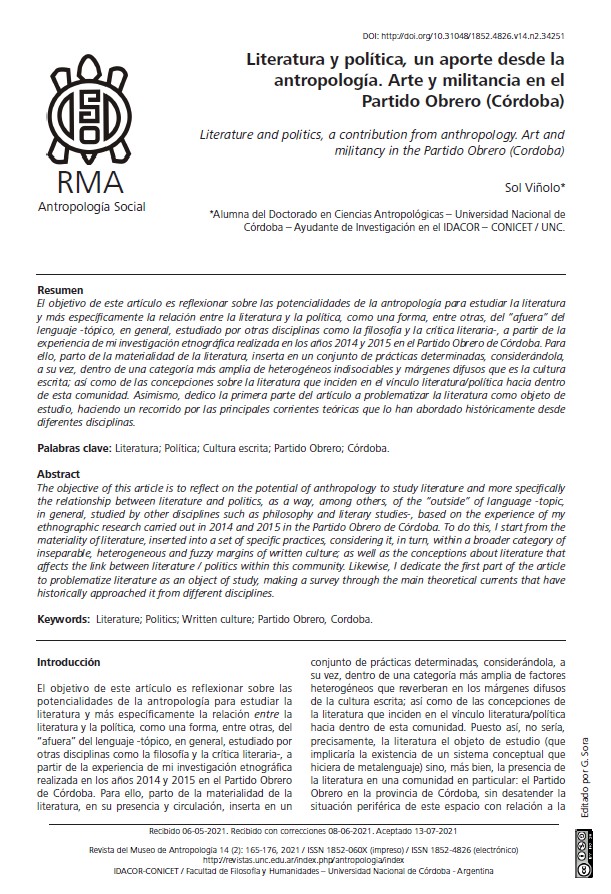Literature and politics, a contribution from anthropology. Art and militancy in the Partido Obrero (Cordoba)
DOI:
https://doi.org/10.31048/1852.4826.v14.n2.34251Keywords:
Literature, Politics, Written culture, Partido Obrero, CordobaAbstract
The objective of this article is to reflect on the potential of anthropology to study literature and more specifically the relationship between literature and politics, as a way, among others, of the “outside” of language -topic, in general, studied by other disciplines such as philosophy and literary studies-, based on the experience of my ethnographic research carried out in 2014 and 2015 in the Partido Obrero de Córdoba. To do this, I start from the materiality of literature, inserted into a set of specific practices, considering it, in turn, within a broader category of inseparable, heterogeneous and fuzzy margins of written culture; as well as the conceptions about literature that affects the link between literature / politics within this community. Likewise, I dedicate the first part of the article to problematize literature as an object of study, making a survey through the main theoretical currents that have historically approached it from different disciplines.
Downloads
References
Agamben, Giorgio (2009) Elogio de la Profanación. Profanación. Buenos Aires: Adriana Hidalgo.
Bourdieu, Pierre (1997) Las reglas del arte. Génesis y estructura del campo literario. Barcelona: Anagrama.
Bourdieu, Pierre (1983) Campo de poder, campo intelectual. Buenos Aires: Folios.
Bourdieu, Pierre; Chartier, Roger y Darnton, Robert (2001) “Diálogo a propósito de historia cultural”. Archipiélago, Cuadernos de crítica de la cultura 47.
Burke, Peter (1993) Formas de hacer historia. Madrid: Alianza.
Boczkowski, Franco (2013) Razones personales. Córdoba: Nudista.
Breton, André; Rivera, Diego; Trotski, León [1938] “Manifiesto por un arte revolucionario independiente”, México. Disponible en: http://sgpwe.izt.uam.mx/files/users/uami/nivon/BRETON_manifiestopdf.pdf
Cabral, Eugenia; y varios (2013) Poesía por Mariano Ferreyra. Córdoba: Babel Editorial.
Candido, Antonio (2006) Literatura e sociedade. Río de Janeiro: Ouro sobre Azul.
Chartier, Roger (2006) Inscribir y borrar: cultura escrita y literatura (siglos XI-XVIII). Buenos Aires: Katz.
Darnton, Robert (2003) Edición y subversión. Literatura clandestina en el Antiguo Régimen. México D.F.: Turner - Fondo de Cultura Económica.
Derrida, Jacques. (1989) La escritura y la diferencia. Barcelona: Antrophos.
Eagleton, Terry (2013) Marxismo y crítica literaria. Buenos Aires: Paidós.
Foucault, Michel (1995). Nietzsche, Freud, Marx. Buenos Aires: Ediciones El Cielo por Asalto.
Foucault, Michel (1997) El pensamiento del afuera. Valencia: Pre–Textos.
Freud, Sigmund Freud (1979) “La interpretación de los sueños”. Obras completas, vol. IV y vol V. Buenos Aires: Amorrortu.
Gadamer, Hans-Georg. (1992) Verdad y método II. Salamanca: Ediciones Sígueme.
Goody, Jack (1996.) Cultura escrita en sociedades tradicionales. Barcelona: Gedisa.
Gramsci, Antonio (1967) La formación de los intelectuales. México D. F.: Grijalbo.
Hauser, Arnold (1978) Historia social de la literatura y el arte. Barcelona: Labor.
Marx, Karl (2005) El capital. México D.F.: Siglo XXI.
Nietzsche, F. (1996) La genealogía de la moral. Madrid: Alianza.
Nietzsche, F. (1972) Obras completas V (“Sobre la verdad y la mentira en sentido extramoral”). Buenos Aires: Aguilar.
Rama, Ángel (2008) Transculturación narrativa en América Latina. Buenos Aires: El andariego.
Rama, Ángel (1998) La ciudad letrada. Montevideo: Arca.
Rojas, Diego (2011). ¿Quién mató a Mariano Ferreyra?. Buenos Aires: Norma.
Viñas, David (1970) Literatura argentina y realidad política: de Sarmiento a Cortázar. Buenos Aires: Siglo Veinte.
Williams, Raymond (1997) Marxismo y literatura. Barcelona: Península.

Downloads
Published
Issue
Section
License
Copyright (c) 2021 Sol Anahí Viñolo

This work is licensed under a Creative Commons Attribution-NonCommercial-ShareAlike 4.0 International License.
Those authors who have publications with this Journalaccept the following terms:
a. Authors will retain their copyrights and guarantee the journal the right of first publication of their work, which will be simultaneously subject to the Creative Commons Attribution License (Licencia de reconocimiento de Creative Commons) that allows third parties to share the work as long as its author and his first publication in this journal.
b. Authors may adopt other non-exclusive licensing agreements for the distribution of the version of the published work (eg, deposit it in an institutional electronic file or publish it in a monographic volume) provided that the initial publication in this journal is indicated.
c. Authors are allowed and recommended to disseminate their work on the Internet (eg in institutional telematic archives or on their website) before and during the submission process, which can lead to interesting exchanges and increase citations of the published work. (See The Effect of Open Access - El efecto del acceso abierto)











